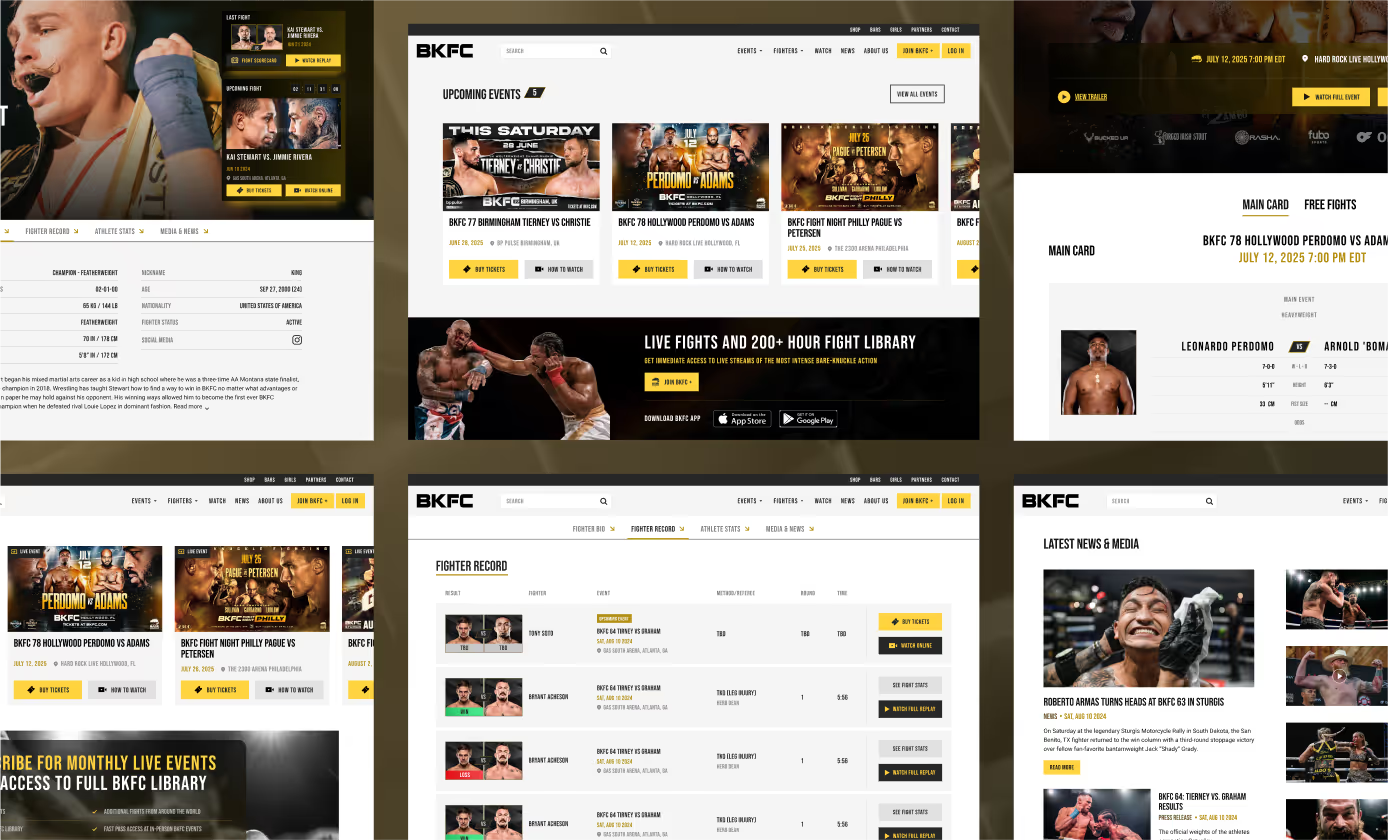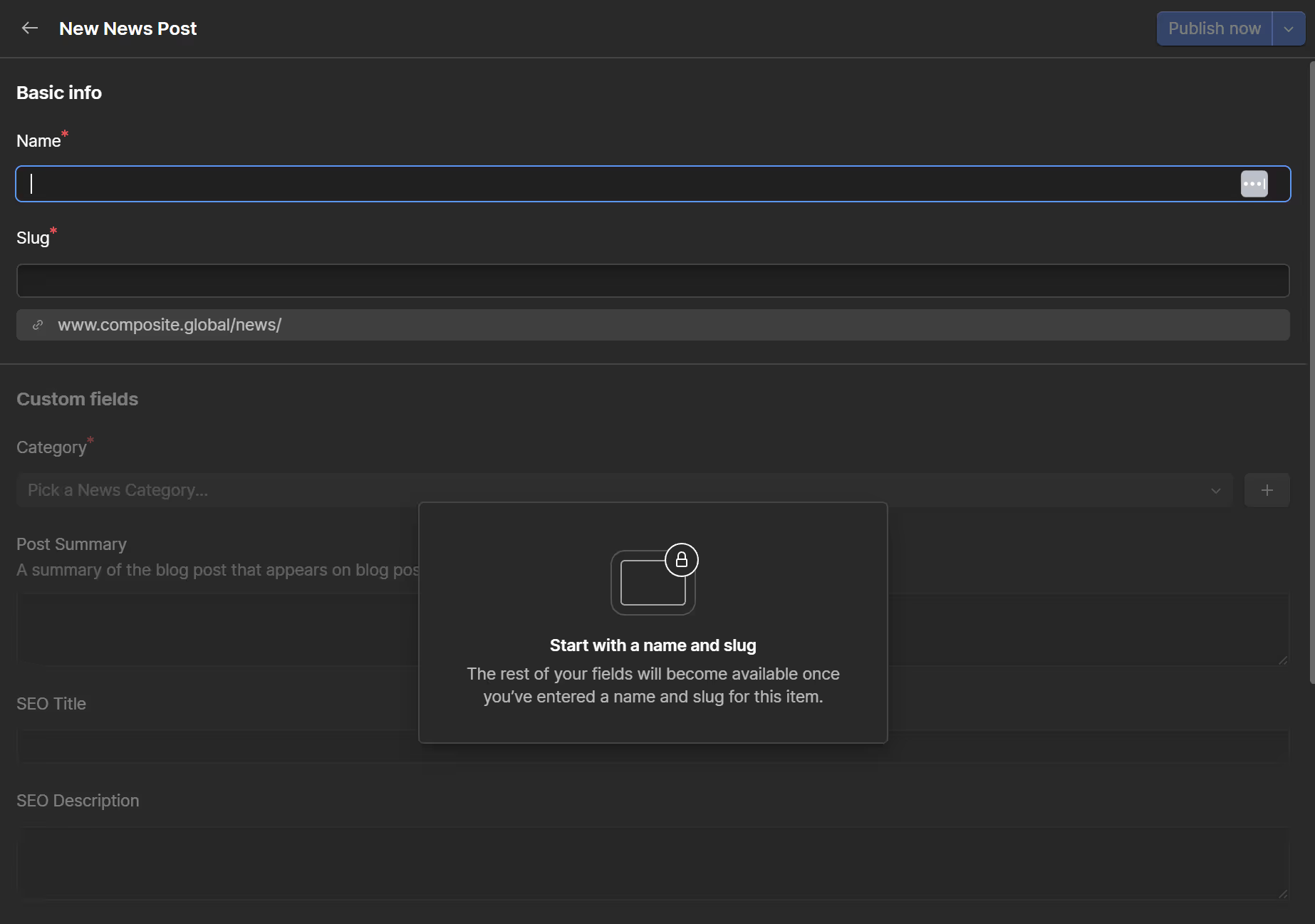Why Your CMS Choice Matters
Your CMS does more than hold blog posts. It shapes your workflow, impacts SEO, and determines how quickly you can respond to market shifts. The wrong platform can slow down teams with clunky interfaces, costly plugins, or rigid templates.
The right one unlocks:
- Responsive design across devices without extra dev time.
- SEO optimizations baked into the publishing workflow.
- Scalable digital experiences for marketing teams and developers alike.
- Faster migrations and integrations with your existing digital marketing tools.
A great example is our work with Bare Knuckle Fighting Championship (BKFC). Their previous site lacked mobile optimization, CMS flexibility, and a clear system for updating fighter profiles, events, and press recaps.
We rebuilt BKFC’s site in Webflow with a custom CMS-driven structure to manage hundreds of fighters, events, and content types. The backend was carefully organized for scale while remaining intuitive for their team. Visually, we leaned into bold graphics, clip paths, and a gritty, high-energy design system that captured the intensity of fight night. The result was a scalable, user-friendly CMS that not only supported daily updates but also carried their brand identity seamlessly across digital platforms.
For more on our work with BKFC, read How BKFC brought fight night energy to every screen.

The Most Common CMS Options
When evaluating CMS platforms, it’s tempting to assume they’re interchangeable. In reality, each platform has strengths and limitations that impact scalability, SEO, and design flexibility.
Contentful
- Strengths: Headless CMS with powerful APIs, flexible content modeling, and multi-channel publishing. Strong for scaling digital experiences across web, mobile, and apps.
- Weaknesses: No visual editor out of the box. Requires developer resources. Can get expensive at scale, and less intuitive for non-technical users compared to visual-first CMS platforms.
- Best for: Enterprises and teams managing content across multiple platforms who need maximum flexibility and are comfortable with a developer-driven setup.
Squarespace
- Strengths: Sleek, professionally designed templates with built-in ecommerce, blogging, and scheduling tools. All-in-one solution with hosting, domains, and design in a single package.
- Weaknesses: Template rigidity makes deep customization harder. Not ideal for large-scale CMS needs or multi-team workflows. Performance can decline with content-heavy sites.
- Best for: Portfolios, blogs, and small online stores where aesthetics matter more than complex functionality.
WordPress
- Strengths: Highly flexible with a massive plugin ecosystem, strong blogging heritage, and a large developer community. Can scale with the right hosting and management.
- Weaknesses: Security vulnerabilities, plugin bloat, and frequent updates can create maintenance headaches. Performance varies widely depending on setup.
- Best for: Blogs and small-to-midsize businesses that need flexibility and don’t mind managing plugins or hiring developers.
Drupal
- Strengths: Powerful and highly customizable for large, complex websites. Robust user permissions and strong support for enterprise-level workflows.
- Weaknesses: Developer-heavy, steep learning curve, and slower marketing workflows without technical support. Smaller ecosystem compared to WordPress.
- Best for: Enterprises or organizations with complex structures, multilingual needs, or in-house dev teams.
Webflow CMS
- Strengths: Visual-first design, structured content modeling, advanced SEO controls, and fast built-in hosting. Great for rapid design changes and marketing flexibility.
- Weaknesses: Not ideal for very high-volume ecommerce, great for those with small inventories. Requires some training for complex CMS setups.
- Best for: Businesses prioritizing design, marketing speed, and scalable content workflows—especially startups, agencies, and brands looking for modern digital experiences.
As one of the earliest dedicated Webflow Agencies, we help migrate sites from legacy platforms like WordPress to Webflow, bringing teams more control over their content. Check out our Development Services to learn more about our migration process and see our other sought-after services like integrations and more.

When Custom CMS Solutions Make Sense
Sometimes, out-of-the-box platforms aren’t enough. A custom CMS solution built on Webflow or tailored with APIs offers:
- Unique content structures (e.g., case studies, product libraries, knowledge bases).
- Integrations with CRMs, analytics, or marketing automation tools.
- Future-proof workflows without plugin dependencies.
At Composite, we often migrate businesses from WordPress or Drupal into Webflow CMS for this reason: it’s the best balance of design freedom, scalability, and performance. Once we hand the site off, the CMS is easily edited by internal teams, no devs needed.
Update from the 2025 Webflow Conference
Webflow just introduced AI-assisted schema markup and new CMS performance upgrades, making it even easier to scale structured content. These updates (rolling out later this year) help businesses improve SEO on Webflow and ensure AI systems can parse site data effectively.
For teams that want both modern UX strategy and AI-ready content structures, these changes make Webflow CMS a compelling choice over older platforms.
Read Webflow Conference 2025: The Key Updates You Need to Know for more.
How to Choose the Right CMS for Your Business
Ask these key questions before committing:
- Who will use it most? Developers, marketers, or both?
- How complex is your content? Do you need simple blogs or layered content models?
- Will you scale globally? Consider localization and multi-language features.
- Do you rely on integrations? Think about CRMs, eCommerce, analytics, and automation tools.
- What about future migrations? Avoid platforms that will lock you in or limit redesign flexibility.
Our Perspective
There isn’t a one-size-fits-all CMS. But if your goals include mobile-friendly website development, high-performance SEO, and design-led digital experiences, Webflow CMS consistently stands out as the most versatile platform.
At Composite, we specialize in CMS web development services, migrations to Webflow, and building custom CMS solutions that align with your brand and business goals. Whether you’re scaling an online retail business or designing the next great marketing site, we help you choose a CMS that sets you up for long-term success.
Looking for a design agency in New York to help build a better CMS? Let's talk!




.svg)
.svg)





.avif)





